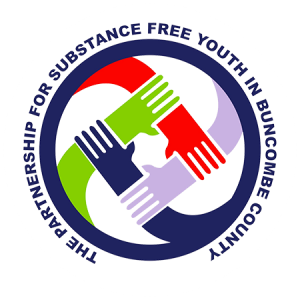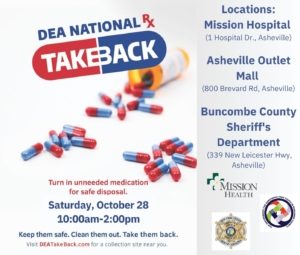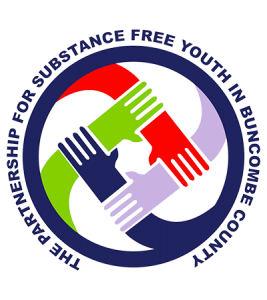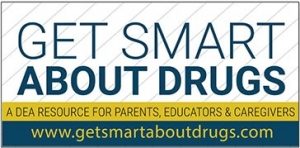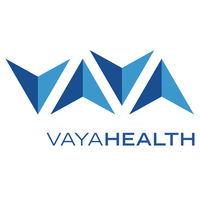The Partnership for Substance Free Youth in Buncombe County (PSFYBC) is taking part in the semi-annual National Drug Enforcement Agency Prescription Take Back Day Saturday, April 22 at several locations across Buncombe County.
PSFYBC is collaborating with local law enforcement and businesses from 10 a.m. to 2 p.m. at three locations Saturday. These drug take-back events allow the community to safely dispose of unused or expired medicines in a convenient and responsible way.
Saturday’s event will take place at multiple locations across Buncombe County from 10 a.m. to 2 p.m.:
Sheriff’s Satellite Office: 339 New Leicester Hwy
Asheville Outlets: 800 Brevard Rd.
Mission Hospital: 1 Hospital Drive
Radioactive medications, such as cancer medications, cannot be accepted at the take-back event. Needles or sharps will also not be accepted.
“Our drug take backs are a great opportunity to clean out your medicine cabinets and safely and anonymously turn in prescription drugs. This is a safe and practical way to prevent opioid and prescription medication-related deaths,” states Buncombe County Sheriff Quentin Miller
Thank you, HCA Healthcare for inviting Prevention Coordinator, Miranda Poe to do an interview and for supporting the DEA National Take Back Days through the “Crush the Crisis” initiative. Check out their 2022 video below.
Overdose deaths accounted for more deaths in 2020 than car crashes, gun violence, and HIV-AIDS combined.
The opioid epidemic has killed over half a million people in the US since 1999. 15 states have agreed to abandon their fight to block the bankruptcy plan of Purdue pharma, maker of Oxycotin. In exchange, Purdue will release 10s of millions of documents and pay a settlement expected to reach 4.5 billion dollars. The Sackler family, the owners of Purdue, will agree to cede ownership, but will not have to admit their responsibility in fueling the opioid epidemic and will also be protected from future lawsuits.
Dr. Blake Fagan and Anne Seaman discuss how you can make your home safer for the holidays. Read the article linked below.
The first step when you suspect your teen has a substance abuse problem is to have your child screened by a experienced medical doctor, certified substance abuse counselor, or an addiction specialist.
Once a diagnosis is made that the teen has a substance abuse disorder, they will be referred for treatment, which helps them stop using the drugs they are addicted to. In March 2014 the Academy of Pediatrics recommended substance abuse screening as part of all adolescent care using the universal Screening for Substance Use, Brief Intervention and/or Referral to Treatment (SBIRT) guidelines designed by the Substance Abuse and Mental Health Administration. A pediatrician can give positive feedback to a teen who hasn’t yet been involved in alcohol and drug use and encourage behavior changes or refer to treatment for those who have been found with a substance abuse disorder.
Screening, Brief Intervention, and Referral to Treatment (SBIRT)
SBIRT is a comprehensive, integrated public health approach to the delivery of early intervention and treatment services for persons with substance use disorders, as well as those at risk of developing these disorders. Where are intervention services provided for the at-risk substance user before more serious consequences occur? At primary care centers, hospital emergency rooms, trauma centers, and other community settings.
Screening: Quickly evaluates the severity of substance use and identifies the appropriate level of treatment.
Brief intervention: focuses on increasing insight and awareness for substance use and motivation toward changes in behavior.
Referral to treatment: Provides those identified as in need of more extensive treatment with access to specialty care.
Research shows that to ensure success for most patients, treatment should combine treatment medications, where available, with behavioral therapy. Today with the Affordable Care Act (ACA) many youth covered under a parent’s health insurance policy are able to receive addiction treatment and care until they are 26. After that the teen can get insurance on his own that will cover his treatment needs. The ACA requires insurers to cover mental health and substance abuse disorder treatment at the same level they’d cover any other medical treatment. Without treatment, a teen may not enter recovery and get back on track at school or work to build the life she hoped to. Recovery is when a person quits taking drugs and starts learning how to live life without drugs.
Substance abuse addiction is typically a chronic disease.
- Relapse is common. Relapse prevention services may increase the success of long-term recovery.
- Long-term or repeated episodes of care for long-term abstinence and recovery are very important.
- Stopping drug use for a few days does not guarantee being cured.
People can recover from drug addiction, but they must be aware of their addiction and work on not using again. Those who are treated for a substance abuse disorder or addiction will have a life of recovery.
If you are seeking treatment for your child, please call VAYA Health
1-800-849-6127. (Toll free 24/7)
Having a crisis? Need immediate help? Call 1-800-849-6127. (Toll free 24/7)
Tiene una crisis? ¿Necesita ayuda inmediata? Llame al 1-800-849-6127. (Llamada gratuita 24/7)
Mobile Crisis Management 1-800-573-1006
You can also contact the Substance Abuse and Mental Health Services Administration’s (SAMHSA) National Drug and Alcohol Treatment Service at 1-800-662-HELP (4357) for information on hotlines, counseling services, or treatment options in your State. Information is also available in Spanish. Drug treatment programs by State also may be found online at: www.findtreatment.samhsa.gov
For information on Recovery and Celebrating Recovery Month, go to this link:
http://www.drugabuse.gov/about-nida/noras-blog/2013/09/national-recovery-month
Teens can live a successful life when they are able to receive treatment and the support of family and friends while in recovery.
How to Safely Store Medications
Store medications in secure locations such as:
- Lock-boxes
- Medication Safes
- Locked cabinets
- Or other lockable spaces
Avoid storage places where children and others can easily access, such as:
- Drawers
- Nightstands
- Or unlocked kitchen cabinets
How to Dispose of Medications
Once finished with a prescription medication, you have three options for disposal:
- Safely dispose of medications by placing them in a local drug drop-box:
- Lobby of Buncombe Sheriff’s Office – 339 New Leicester Highway, Leicester, NC
- Lobby of Buncombe County Courthouse – 60 Court Plaza, Asheville, NC
- Lobby of Asheville Police Department – 100 Court Plaza, Asheville, NC
- Take advantage of community drug take-back programs that allow the public to bring unused medications to central locations for proper disposal.
- No drop-box or take back near you? Dispose medications safely at home:
- Remove pills from bottle and mix them with undesirable substances
such as kitty litter or coffee grounds. - Throw away the sealed mixture into the trash.
- Remove the prescription label and dispose of the empty bottle.
- Remove pills from bottle and mix them with undesirable substances
The Partnership for Substance Free Youth in Buncombe County will host several medication drop off sites for the DEA National Prescription Take Back day on Saturday 10/26/19 from 10am-2pm in collaboration with local businesses and law enforcement. Through these events and permanent medication drop boxes in our community, The Partnership for Substance Free Youth in Buncombe County has already collected 400 pounds of unneeded or expired prescription medications in 2019.
Last fall Americans turned in nearly 469 tons (more than 937,000 pounds) of prescription drugs at nearly 6,300 sites operated by the DEA and almost 5,000 of its state and local law enforcement partners. Overall, in its 17 previous Take Back events, DEA and its partners have taken in more than 11.8 million pounds—approximately 5,900 tons—of pills.
This initiative addresses a vital public safety and public health issue. Medicines that languish in home cabinets are highly susceptible to diversion, misuse and abuse. Rates of prescription drug abuse in the United States are alarmingly high, as are the number of accidental poisonings and overdoses due to these drugs. The Substance Abuse and Mental Health Services Administration’s National Survey on Drug Use and Health shows year after year that the majority of misused and abused prescription drugs are obtained from family and friends, including someone else’s medication being stolen from the home medicine cabinet. In addition, Americans are now advised that their usual methods for disposing of unused medicines—flushing them down the toilet or throwing them in the trash—both pose potential safety and health hazards.
For the first time, the DEA and The Partnership for Substance Free Youth in Buncombe County, will also accept vaping devices and cartridges at any of its drop off locations during the Take Back Day. Many concerns have been raised lately across the United States over illnesses and death caused by vaping and the high youth vaping initiation rates. In an effort to support a healthy lifestyle and energetic population, especially amongst Americas’ youth, DEA is committed to doing all it can to help safely dispose of vaping devices and substances.
Participating in National Take Back Day provides community members with an opportunity to help prevent prescription and over-the-counter medicine misuse and abuse by disposing of unused or expired medicines in a safe, convenient, and responsible way. In addition, community members can help prevent and reduce youth initiation of vaping nicotine and other harmful substances by disposing of vaping devices and cartridges.
For more information about the disposal of prescription drugs or about the October 26 Take Back Day event, go to www.DEATakeBack.com
The event will take place at multiple locations across Buncombe County from 10am-2pm:
Walgreens: 1124 Patton Ave, Asheville
Walgreens: 1835 Hendersonville Road, Asheville
Walgreens: 91 S. Tunnel Road, Asheville
Walgreens: 841 Merrimon Avenue, Asheville
CVS: 425 W State St. Black Mountain
Asheville Airport – Public Safety Building, Fletcher
SONA Pharmacy: 805 Fairview Rd, Asheville
Asheville Mountain Pharmacy: 1272 Tunnel Rd. Ste 20, Asheville
Please remove identification from all medications, and separate pills, liquids and inhalers into different bags or containers. We cannot accept radioactive medications such as cancer medications. Also, we cannot accept needles or sharps. All medications collected during the event are considered anonymous and will be incinerated by the Drug Enforcement Agency.
